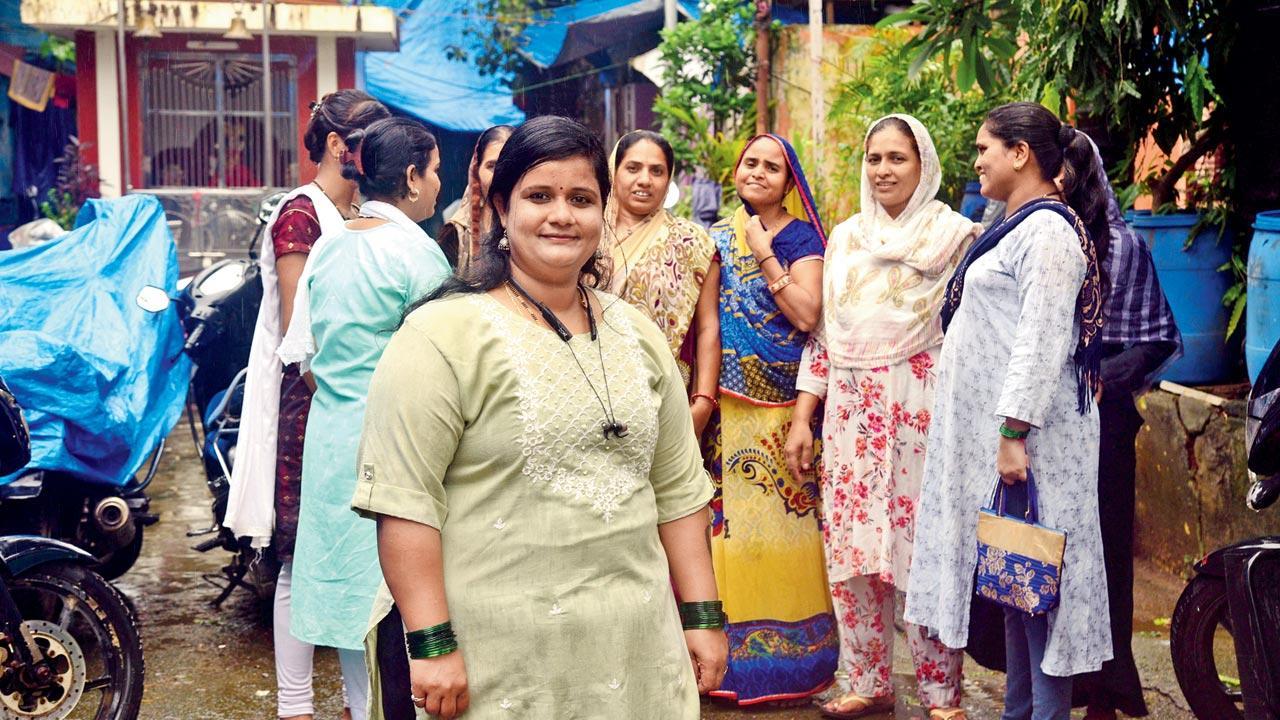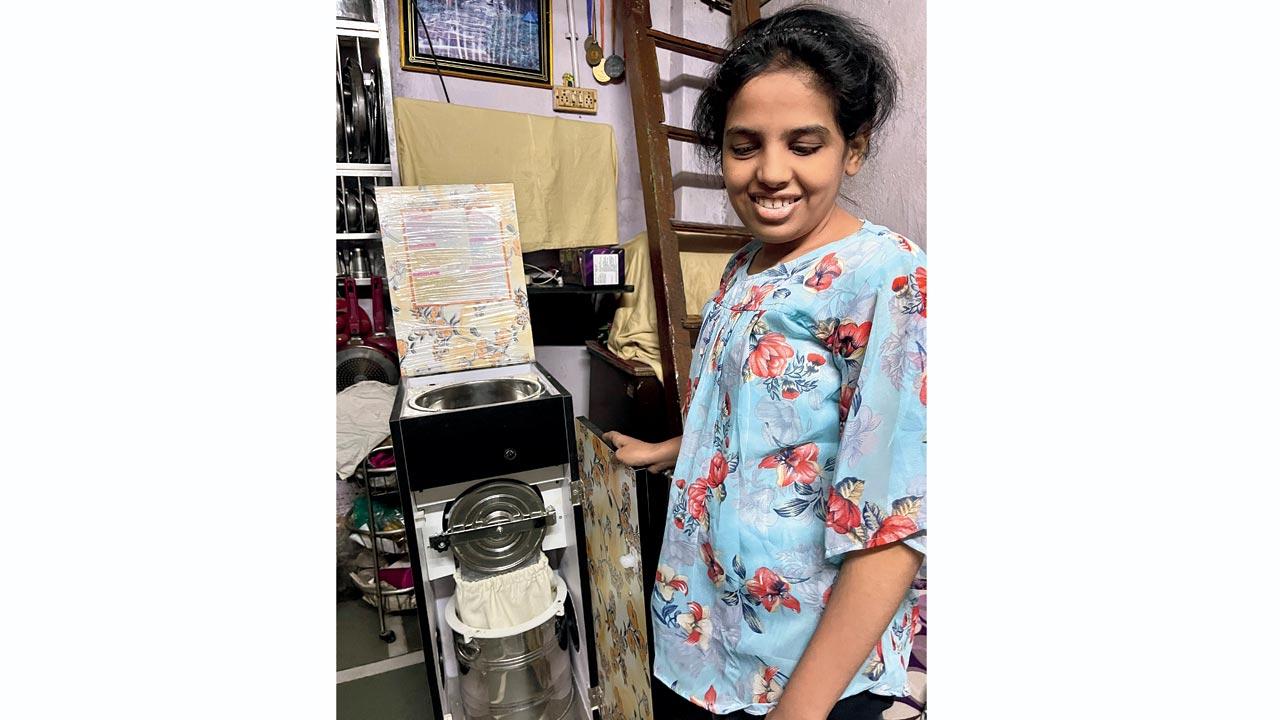Rasika Kadam | Mentor| through YouthAid Foundation, has coached thousands, mainly women from slums, villages and tribal areas, to set up their own businesses

YouthAid Foundation’s Rasika Kadam in Dharavi. Pic/Pradeep Dhivar
Hard work leads to success, but sometimes, one does not know which path to take. This is where a mentor can help. Rasika Kadam has turned such a mentor for thousands of people, mainly women from slums, villages and tribal areas. She helps housewives exercise their right to work, gets widows to become financially independent, and even solves the illegal street vendor issue, successfully turning their lives around.
ADVERTISEMENT
Kadam helps women who are even scared to talk to strangers, to turn into outgoing grassroots entrepreneurs through Entrepreneurship Development camps she holds for YouthAid Foundation. Since moving to Mumbai in 2021 from Pune, she has helped 7,000 people move from a life of majboori (compulsion) towards financial independence and purpose, by starting a micro/ nano or small business. Kadam completed MSW and become a social worker as she cannot see that people’s potential is getting wasted, “it just takes little knowledge to change”.
“There is a deep rooted workers’ mentality in our society due to the system created by corporations and leaders where even if profits at the top increase, the workers’ salaries do not, as they know their desperation for Rs 5,000 and Rs 10,000. Getting beneficiaries to accept a life of self-employment is hard, as they are attached to the concept of getting a secure source of income. But when I start explaining that the value of the work is more than what they earn in jobs, they start opening up. They usually do not know what a good life is so I ask them to think about the freedom to go on a holiday, receive acknowledgements without abuse, spend time on one’s health, etc. which come with having your own business. What they earn in 8 hours of their job, they can earn in 2 hours of doing business minus the abuse,” said Kadam, who takes participants through the process of finding an idea via market surveys, setting the right price, sourcing the right material, gaining financial literacy, digital literacy, communicating their pitch, customer handling, etc. She lives in Badlapur and sets up these camps in the slums of Matunga, Dharavi, Navi Mumbai and Thane. “At first participants are anxious about going to a far off market alone, then once they do that, they are scared to pose questions to strangers, then they move to the next stage of losing inhibitions,” Kadam added.
 Prachi Gobde with the aata chakki machine she received
Prachi Gobde with the aata chakki machine she received
She teaches her mentees how to sell products that they already make at home. Usually, as the husband sees the money coming in after sale, he allows the wife to venture out into the market to expand.
“My husband underestimated me and used to think I was no good when I said I wanted to start a business. But when he saw the results, his perception of me changed,” said Shabnam Rehman, who has a tailoring business.
Kadam said this mentality of the husband slowly diminishes and could create a ripple effect in society. “House wives are seasoned entrepreneurs, as they have mastered products they make for their family like tea, ladoos, masalas, clothes, cake, etc. They can also multitask. Implemented in business, this know how can make profits,” Kadam said.
Many women who lost their husbands in the COVID-19 pandemic, had to cope with the reality wherein the house’s financial burden was on them. “My husband had diabetes and bone weakness, and as we could not afford medicines, I had to curate homemade recipes to cure his symptoms. Hence I came up with a turmeric and ginger pickle, and beetroot halwa. Slowly his appetite increased and he got better but eventually passed away due to COVID. I have two children to educate and had only ventured 50 metres from my house. How was I to take care of them and the whole house if I did not know how to communicate? Then Kadam told me I could start a business using my skill of pickles and halwa. From being scared and not understanding the world, now I go to other cities to set shop and take care of my family,” said Vandana Kamble, a beneficiary of YouthAid Foundation from Satara.
Prachi Gobde, from Dhorwada in Dharavi who is blind, could not get a job after BA due to her disability which made her question her worth. Through Kadam’s training, she received an aata chakki machine and works from her home as people come and give her orders.
Gobde said she found more purpose in life after starting the business. She has a message for other blind people, “If I can do it so can you. You might think you can’t but don’t give up. If you have trouble leaving the house independently, start something from home like I did. When I was in school and college, I wished I had eyesight like my classmates, Rasikas’s training and United Ways donated atta chakki machine allows me to sit at home and work. I can now save my money and contribute to my brother’s birthday gift.”
Encroachment by illegal vendors on streets causes a nuisance to traffic and also losses for the vendors as authorities confiscate their products. “We encourage our trainees to follow the legal way by showing them options other than encroachment, which eventually harms them in the long run. We help them create a shop act licence and show them legal ways like renting a space outside someone’s shop and spaces around gardens and parks that allow vendors. We encourage them to start from home and then slowly earn and rent a small shop,” Kadam added.
Kadam explains why grassroots businesses fail to compete with big monopolies and fall into the cycle of lifelong debt. “It is the lack of financial literacy and sourcing of raw materials. They start a business to run the house and not to expand the business. If they receive 100, they invest 90 at home and 10 in business. We fix this proportion. Many take loans exceeding the amount they actually need, they take R50,000 for a business that requires R2,000. We teach them the difference between a good loan and bad loan. Five women come together and take a loan as microfinance firms give benefits to such arrangements, but more than often, some members of the group run away and the burden falls on the others. Many times they source materials from more expensive places and of poor quality so we teach them how to hunt for the best quality,” she added.
Mumbai meri jaan?
Love about Mumbai Mumbai has taught me time management. In Pune I had my own vehicle but here it is most convenient to travel by the local train, hence I have to check the schedule and create a buffer period in case it gets late. You have to work according to the clock.
Hate about Mumbai People applaud Mumbai’s spirit but it is actually locals’ majboori to make things work to survive. I hate the rush, trash and air pollution. Sometimes you do not know whether you are swimming or walking.
Will Mumbai be my forever home? I moved here because this is where my husband lives, hence I am doing my best to become a Mumbaikar.
 Subscribe today by clicking the link and stay updated with the latest news!" Click here!
Subscribe today by clicking the link and stay updated with the latest news!" Click here!







